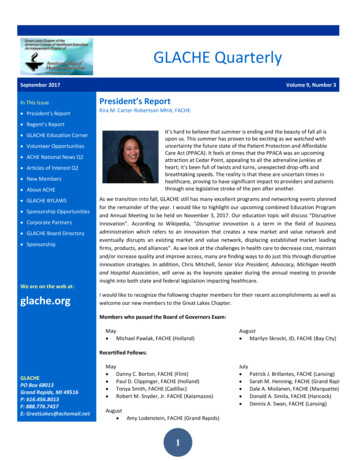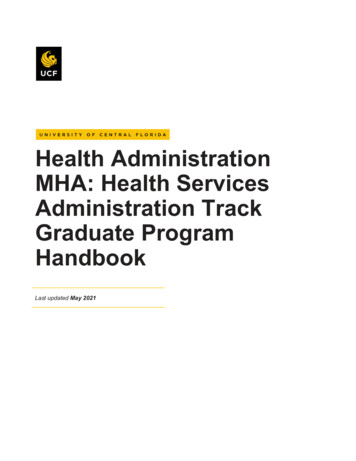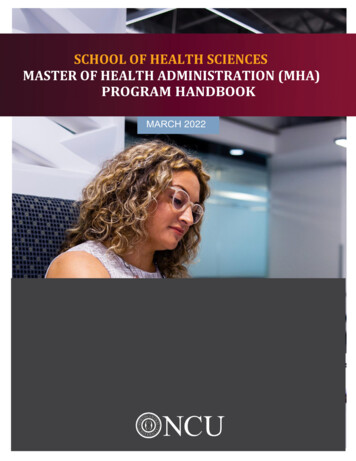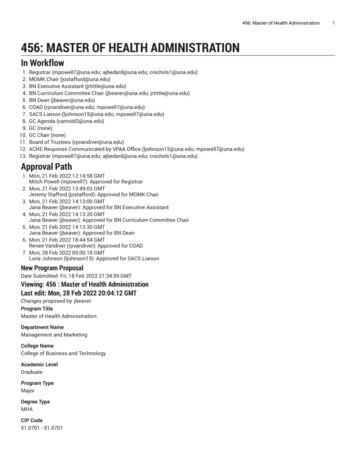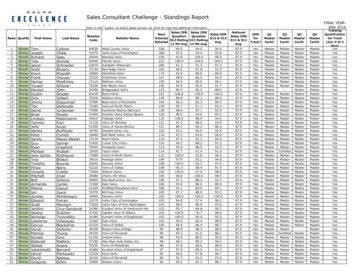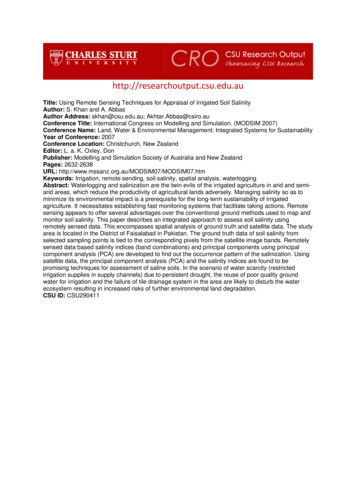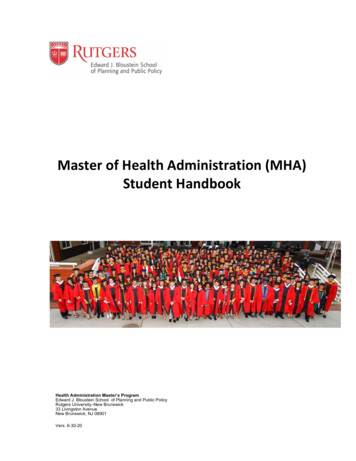
Transcription
Master of Health Administration (MHA)Student HandbookHealth Administration Master’s ProgramEdward J. Bloustein School of Planning and Public PolicyRutgers University–New Brunswick33 Livingston AvenueNew Brunswick, NJ 08901Vers. 6-30-20
Table of 18.19.20.21.22.Mission, Vision, ValuesMHA CompetenciesTraditional Track StructureCourse DescriptionsExecutive Track StructureCourse DescriptionsProgram Policies and ProceduresPolicy for Professional PracticumStudent Advising PolicyAcademic Integrity Policy Overview & ReferenceStudent and Academic Support StaffFamily Educational Rights & Privacy Act (FERPA)Grade Appeal ProcessProgram Cost Structure: 2020-2021Information TechnologyRecommended Laptop SpecificationsAttendance, Deadlines, and Dress PoliciesRequired Health Insurance (Full-time students)Required Identification Cards (RU Connect)Conference Travel FundsLockers and MailboxesAcademic Calendars through 2022Student OrganizationsAbout the Edward J. Bloustein School23478910121619202123242526272930303031323334
MISSION, VISION, AND VALUESMission:The Mission of the Rutgers MHA program is to train entry level and early/mid-level careeriststhroughout New Jersey and its neighboring regions for positions of increasing responsibility andleadership in the healthcare field, and to contribute to the health, economic, and social well-being ofNew Jersey and nearby communities through research, policy, and planning in healthcare.Our graduates will be prepared to recognize and adapt to the challenges of a rapidly changinghealthcare environment. Our practitioner-instructors provide our students with insights based ontheir broad industry experience, as well as an understanding of the challenges today’s healthprofessionals will face as the field evolves. Our faculty is committed to advancing their professionalexpertise in the field of health administration, to ongoing innovation in instructional approaches andmethod, as well as contributing to the field’s knowledge base through research and service.Vision:The Bloustein School’s Master of Health Administration programs strive to become top-tiernationally-ranked programs in preparing entry-level, early careerists, and mid-career level healthcareleaders in the rapidly evolving health administration profession. Our faculty, in conjunction with ourAdvisory Board, will energize our students to sustain their commitment to changes in approaches,processes, and strategies in the healthcare industry. In so doing, our students will become forwardthinking thought- and practice-leaders in healthcare, as the field faces future challenges andembraces future opportunities.Values of the MHA program include: Excellence: Our MHA program will provide our students with curricular and instructionalexcellence. Integrity: Instruction and mentoring throughout our MHA program will demonstrate to, andinstill in, our students a life-long commitment to the highest ethical standards and conduct. Diversity and Inclusion: Our MHA program will embrace diversity and support inclusion inrecruitment and retention of students, faculty, staff, and stakeholders. Our faculty iscommitted to ensuring a learning environment where differing experiences and perspectivewill be freely and openly debated, amid a culture of acceptance and mutual respect. Innovation and Forward Thinking: The MHA program are a committed to currency,relevance, and improvement in healthcare. Our program’s leadership and faculty willcontinually adjust and update our programs through regular efforts to monitor and reviewrapidly emerging trends and services. Continuing Professional Development: The MHA program will instill in our students anunderstanding of, and commitment to, the need for life-long continuing professionaldevelopment. Our leadership and faculty will regularly review the field for bases on which toupdate and refine our competencies, instructional methods, and assessment modalities.3
MHA COMPETENCIESJob analysis surveys conducted on a regular basis under the auspices of the American College ofHealthcare Executives (ACHE) have identified well over 150 detailed competencies “needed tosuccessfully perform as a healthcare manager regardless of the setting.”1 Within this larger context,MHA programs typically identify domains and competencies that are consistent with their missionHealthcareEnvironmentLeadership andProfessionalDevelopmentEntrepreneurshipand InnovationCommunicationand RelationshipManagementManagement &Businessand goals. The following graphic represents the five domains within which the 19 competencies coreto the Rutgers MHA program are contained. Every core course in the program is linked to one ormore of these competencies and it is the student’s responsibility to understand the nature of thecompetency and how he/she is developing such competencies as one progresses through theprogram toward graduation. Knowledge of these competencies should be considered essential.1. The Healthcare Environment1.1 Healthcare Structure: Compare and contrast different types of health services organizations,insurance providers, and healthcare providers.1.2 Health policy, law, and ethics: Examine the health care policymaking process and be able tocritique ethical and legal issues at the local, state, regional, and national level.1.3 Healthcare quality: Analyze the essential domains of healthcare quality assurance (Safe,Effective, Patient-centered, Timely, Efficient, Equitable) and apply efficient measures ofimprovement.1ACHE Healthcare Executive 2018 Competencies Assessment Tool, American College of Healthcare Executives, etencies booklet.pdf, p.1.4
1.4 Disparity in clinical and population-level health outcomes: Analyze the sources of existingdisparity in health outcomes, both at an individual and community level, and predict appropriatemeasures needed to improve population health.2. Leadership and Professional Development2.1 Leadership theories, styles, and practices: Compare and contrast different leadershiptheories, styles, and practices, and support concepts for change management in a variety ofhealth care organizations.2.2. Strategic planning: Examine the importance of the strategic planning process in ahealthcare organization and predict how this process will certify the organization’s mission,vision, and efficient allocation of resources in different situations.2.3 Ethical leadership and commitment to life-long learning: Evaluate the foundation ofethical values and relate these values to ethical responsibilities and a commitment to lifelong learning.3. Management and Business3.1 Quality improvement and measurement: Evaluate the importance of qualityimprovement tools (i.e.: LEAN, Six Sigma) and illustrate their functional use to improveclinical and operational outcomes.3.2 Financial analysis and budgets: Analyze and apply the fundamentals of financialmanagement and budgeting principles and be able to differentiate between various financialreports and matrixes to measure organizational performance.3.3 Operational management: Compare and contrast a variety of different approaches forhealthcare delivery and organizational management of services.3.4. Human resource management: Examine various principles of human resourcemanagement and regulatory requirements in healthcare to generate a plan for improvementin health care delivery.5
3.5 Health Information systems: Appraise the role of health information systems foradministrative and clinical purposes and support the necessity for HIS with emerging issueslike cybersecurity, data privacy and security of healthcare information.3.6. Ethics and compliance: Assess ethics and regulatory compliance issues in healthcare andcreate plans to improve compliance within healthcare systems.3.7 Data Analytics: Compare and contrast various statistical analysis techniques and the useof data visualization software to support the use of healthcare data for benchmarking andbusiness intelligence.4. Communication and Relationship Management4.1 Written Communication: Construct appropriate written reports, memos, and papersusing effective written business communication skills.4.2 Oral Communication: Compose narratives to produce effective verbal communicationskills, in both individual and group settings.4.3 Team Dynamics: Evaluate the importance of teamwork in a healthcare setting and designcompetencies to work effectively in different roles within a team.5. Entrepreneurship and Innovation5.1 Entrepreneurship and Innovation: Compare and contrast examples of disruptivetechnologies and apply it to the healthcare industry to promote innovation.5.2 Emerging Technologies: Examine the role of emerging technologies on the healthcaredelivery system and predict consumer behavior.Students, preceptors andfaculty celebrate finalpresentations of practicums6
PROGRAM/COURSE STRUCTURE: TRADITIONAL TRACKThe Master of Health Administration (Traditional track) at the Bloustein School provides studentswith an interdisciplinary education focused on improving health care, health systems, andpolicy. Participants complete the 45-credit program at their own pace, full- or part-time. Classes areconveniently scheduled in the evenings on weekdays, Saturdays, hybrid, or online during each of thefall, spring, and summer semesters.Traditional Track CurriculumThe 45-credit Traditional MHA track curriculum includes 11 core course and requires completion ofan experiential professional practicum with seminar (6 credits), and 6 credits of approved electives.2 501:501 Principles of Health Administration (3)501:510 Human Resources Policy and Practice in Healthcare Management (3)501:515 Financial Accounting for Managers (3)501:520 Population Health (3)501:533 Lean 6 Sigma Green Belt (3)[Note: 501:533 Lean Six Sigma Green beginning 7/1/2020]501:554 Marketing for Health Care Organizations (3)501:556 Health Care Ethics and Law (3)501:563 Health Systems Operations (3)501:590 Leadership and Professional Development (3)501:571 Finance for Health Administration (3)501:565 Information Systems for Health Care (3)501:595 Professional Practicum with Seminar (6)Six Credits of Approved Electives (6)Current “automatically approved” electives include: 501:512 Health Care Economics (3)501:516 Directed Study (3)501:525 Artificial Intelligence Challenges in Healthcare Management (3)501:530 Data Analytics in Healthcare Management (3)501:534 Lean 6 Sigma Black Belt (3)501:540 Health Care and Life Sciences (3)501:542 Long Term Care (3)501:570 Financing Long Term Care (3)501:572 Managing People and Organizations (3)TOTAL CREDITS 452Professional Practicum with Seminar may be portfolio-based or experiential, depending upon the student’s experience andaccomplishments. 501:501 and 501:515 must be taken in the first semester in which students are enrolled in the program. The six credits ofelectives, chosen from a broad range of courses, allows the program to provide a degree of customization for each student’s interest andneed while doing so within accreditation requirements7
Traditional Track Recommended Course Sequencing3Early Level Courses Principles of Health Administration (501:501) (3) Human Resource Policy and Practice in Healthcare (501:510) (3) Financial Accounting for Managers (501:515) (3) Population Health (501-520) (3)Mid Level Courses LEAN Six Sigma Green Belt (501:533) (3) Marketing for Healthcare Organizations (501:554) (3) Pre-Req 501, 515 Healthcare Ethics and Law (501:556) (3) Pre-Req 501, 515 Health Systems Operations (501:563)(3) Pre-req 501, 515 Information Systems for Healthcare (501:565) (3) Pre-Req 501, 515Upper Level Courses Finance for Health Administration (501:571) (3) Pre-req 501, 515 Leadership and Professional Development (501:590) (3) Pre-req 18credits & either 563 or 571 Professional Practicum with Seminar (501:595) (6) Pre-req 590Traditional Track Course Descriptions34:501:501 Principles of Health Administration (3) The course introduces students to the historicaldevelopment, structure, operation and current/future directions of the American health caredelivery system with an emphasis on health care policy and management.34:501:510 Human Resource Policy and Practice in Health Care (3) The course analyzes core humanresource functions like recruitment and retention, diversity, performance management,compensation and workforce development in the healthcare environment, while aligning humanresources strategy to the business strategy’s goals.34:501:512 Health Care Economics (3) Students will analyze supply demand theory while examiningprofitability, cost analysis and the economic factors that influence healthcare delivery at the microand macro level.34:501:515 Financial Accounting for Managers (3) Students will apply major concepts in health carefinance to align operational functions with the financial objectives within an organization.34:501:520 Population Health (3) This course analyzes the complex economic, environmental, social,and behavioral causes affecting the health of populations. It explores how health care organizationsplan and evaluate the impact of their participation in community health improvement programs.3Of special note in course planning. Leadership and Professional Development (501:590) is a mandatory pre-requisite to the ProfessionalPracticum with Seminar (501:595). Since entry into Leadership has multiple pre-requisites (either 563 or 571 AND a minimum of 18completed credits prior to the start of Leadership), students should anticipate needing two semesters to complete this two-coursesequence (Leadership followed by Practicum). Therefore, entry into Leadership must be met prior to this “upper course”, two-semestersequence.8
34:501:530, Section, Data Analytics in Health Care (3) Students will analyze and interpret hospitaland public data sets for use in strategic decisions-making, trend analysis and business presentations.Advanced excel and other tools will be used to mine data sets, identify patterns, and create datasummaries.34:501:533 Healthcare Six Sigma Green Belt This course is designed to prepare students for the LeanSix Sigma Green Belt certifying exam under the Council for Six Sigma Certification requirements.34:501:554 Marketing for Health Care Organizations (3) This course provides a strong foundation inmarketing principles, tools, and techniques to develop a strategically designed marketing plan forhealth care organizations.34:501:556 Health Care Ethics and Law (3) A systematic analysis of contemporary ethical and legalissues in health care. The class is designed to engender a keener awareness and deeperunderstanding of the interrelationships of legal and ethical underpinnings of the practice andadministration of modern medicine.34:501:563 Health Systems Operations (3) This course provides a macro and micro view of healthcare operations with a focus on critical management theory, fundamental economic principles,employee management, and the art of negotiations.34:501:565 Information Systems for Health Care (3) An exploration of the types and uses ofinformation systems; their management and strategic application; related privacy policies and theirtransformative role in health care delivery.34:501:571 Finance for Health Administration (3) A review of financial management tools forvarious health care delivery settings to allow students to interpret financial information, assess theprocesses performed by financial departments, and explore the financial managementresponsibilities of health leaders.34:501:575 Understanding Health Care Payer Systems (3) To provide a fundamental understandingof the three predominant forms of health insurance coverage in the United States (Medicare,Medicaid, and commercial).34:501:590 Leadership and Professional Development (3) An in-depth look at leadership styles,traits and strategies using critical thinking and complex analysis that addresses multifacetedhealthcare case studies involving best practices and change management.34:501:595 Professional Practicum with Seminar (6) A capstone field experience in an approvedhealthcare facility designed so students apply healthcare theory to practice in a real-world setting.Students complete an outcomes-driven project that is presented as a written business analysis and aformal presentation in a public forum.9
PROGRAM/COURSE STRUCTURE: EXECUTIVEThe Master of Health Administration (Executive track) at the Bloustein School is tailored for thehealth professional with at least five years of experience. Our newly designed curriculum presentsinformation in four sequential, 9-credit modules or clusters – courses grouped together in commonthemes and two experiential summers. At the start of each module, cohorts take on a complexhealth care problem and collaboratively create innovative solutions.This small, cohort based option allows for convenient Saturday scheduling and team basedcompetency development. The 45-credit Executive track is designed to be completed in two years.Executive Track Recommended Sequence (with Traditional Track Equivalencies)Executive Theory Cluster1 (9) Spring 1Principles of Health AdministrationFinancial Accounting for ManagersHealth Systems OperationsManagement PracticeSummer 1 (3) Summer 1Health Systems OperationsInformation Systems for HealthcareFinance for Health AdministrionExecutive PracticeCluster 2 (9) Fall 1Health Systems OperationsFinance for Health AdministrationMarketing for Healthcare OrganizationsExecutive LeadershipCluster 3 (9) Spring 2Finance for Health AdministrationLeadership and Professional DevelopmentPrinciples of Health AdministrationProfessionalDevelopment SeminarSummer 2 (6) Summer 2Population HealthInformation Systems for HealthcareExecutive Professional DevelopmentExecutive InnovationCluster 4 (9) Fall 2Healthcare Law, Ethics & Professional DevelopmentHuman Resource Policy and Practice in HealthcareLEAN Six Sigma Green BeltExecutive Track Course DescriptionsExecutive Theory Cluster 1 34:501:581 (9)This cluster is for MHA Executive Track students and provides health care practitioners with a macroand micro view of the current health care environment.by assessing and interpreting criticalmanagement theory, fundamental economic principles and essential analytical skill for problemsolving.10
Management Practice Summer 1 34:501:585 (3)MHA Executive Track students interact with members of the C-suite for a health care facility.to applyand analyze critical management by focusing on the micro and macro healthcare environment.Executive Practice Cluster 2 34:501:582 (9)This course analyzes and evaluates key management functions at an advanced level including the roleof value-based performance in health structures; strategies for growth and financial sustainability, anunderstanding of various cost-structures and their impact on an organization’s financial performance.Restricted to MHA Executive Track students only.Executive Leadership Cluster 3 34:501:583 (9)The course focuses on leadership, healthcare financing and strategic planning by examining theimpact of the health reform upon hospital finances, the formation of health systems, strategicdecision making, governance and the increased focus on quality of care and health informationtechnology. Restricted to MHA Executive Track students only.Professional Development Seminar Summer 2 34:501:586 (6)This cluster course enables MHA Executive Track students to self-assess their skills by building aprofessional portfolio and examine the role of the information system within the U.S. health caresystem and to improve population health. Restricted to MHA Executive Track students only.Executive Innovation Cluster 4 34:501:584 (9)This course is designed to provide MHA Executive Track students with a systematic analysis ofcontemporary ethical and legal issues in health care, human resource management and patientquality improvement. Students will also become proficient in LEAN Six Sigma techniques at the GreenBelt level.11
PROGRAM POLICIES AND PROCEDURESMHA Program AdmissionMHA Admission committee. The MHA program admissions committee consists of at least three, andno more than five full-time MHA faculty members. The members of the Admissions Committeereview applicants and assess the likelihood of success in the program. A majority of faculty reviewersmust recommend admission (2 of 3, 3 of 5) in order for a candidate to be admitted.Admission criteria include:Completion of anundergraduate degree with aminimum grade point averageof 3.000 or better. GREs areoptional. Special focus isprovided on growth andmaturation duringundergraduate studies asdefined as improvement inacademic performance andcompetence over time.Highly recommended criteria:Employment in the HealthcareManagement area or cognateprofessional area.International students: TOEFL scores of 85 or better are expected.Non-matriculation Status: Any member of the Admissions Committee can initiate and request of theProgram Director a special review in instances where special circumstances might call for admissionconsideration but which may not be obvious during review of materials. In special circumstances,applicants may be considered for non-matriculation status, a special status during which timepotential candidates for admission may demonstrate their/his/her ability to thrive in the MHAprogram. In such cases, non-matriculation status requires maintaining at least a 3.00 GPA, preferablya 3.25 or better GPA, during completion of the first 12 credits, upon which the candidate may ask tobe reconsidered for admission. Applicants completing 12 credits with a 3.25 GPA or better wouldnormally be offered admission for matriculation. NOTE: Students must compete a new application foradmission after they have successfully completed 12 credits in Non-Matriculation status. Those 12credits must then be transfer into their degree program once fully accepted.Credits required for the MHA: Successful completion of the Master of Health Administrationprogram requires satisfactory completion of 45 approved core and elective credits beyond thebaccalaureate.Minimum Grade Point Average required for degree completion: Students enrolled in the RutgersMaster of Health Administration program must achieve a final Grade Point Average of 3.000 or betterin order to be awarded the MHA degree.Limitation of grades: Students in the MHA program may use no more than six (6) credits of coursesin which the grade of “C” is earned toward completion of the degree. Exception: elective course(s)taken at other graduate professional programs at Rutgers for which a “C” is regarded as anacceptable grade (e.g. the Law School) and in which the graduating GPA may be lower than a 3.000.12
Academic Review: Students must achieve the following minimum performance to insureuninterrupted enrollment and registration:0 through 17 credits 2.750 or better18 through 26 credits 2.850 or better27 through 32 credits 2.925 or better33 through 41 credits 2.950 – 3.10045-credits & degree eligibility 3.000 or betterMandatory review for academic performancebelow 2.750 with probable dismissalMandatory review for academic performancebelow 2.850 with probable dismissalMandatory review for academic performancebelow 2.925 with possible dismissalMandatory reviewEligible for degreeAcademic review is the responsibility of the MHA Program Director, who is authorized to delegateportions or all of this responsibility to full-time employment staff and/or participating MHA Corefaculty.Non-degree students allowed to register on a conditional basis must maintain a 3.250 or better gradepoint average after completing 12 credits, at which time they may apply for full matriculation status.Once admitted as matriculating, these students shall also be subject to the academic performancestandards outlined above.Universal Review: All students enrolled in the MHA program, both matriculating and non-degree,shall be evaluated each semester vis-à-vis satisfactory progress toward the MHA degree. Studentshaving a qualitative deficiency shall be notified in writing and have developed a remediation plan.Matriculation Continued: In order to ensure seamless re-entry in instances requiring a break inacademic studies, MHA students in good academic standing may register for Matriculation Continuedstatus. NOTE: International students cannot remain in the United States on matriculation continued,however they can apply for a reduced credit load, allowing them to take fewer than 9 credits asemesterLimited Single Course WaiverMaster of Health Administration (MHA) students who have completed a Bachelor of Science in HealthAdministration from the Bloustein School, with an “A” in their Introduction to Health Administration(10:501:203) course, can substitute the undergraduate course for the required 34:501:501 Principlesof Health Administration (34:501:501). NOTE: This is a waiver of the course requirement only, notadvanced standing of the 3 credits. Students receiving the waiver must take an additional 3 credits tocomplete the 45-credit degree requirement. Master of Health Administration (MHA) students who have completed a Bachelor of Sciencein Health Administration from another accredited institution with an “A” in a course closelyrelated to undergraduate Introduction to Health Administration class (10:502:201) cansubstitute the graduate Principles of Health Administration (34:501:501) course with agraduate elective course from the Bloustein School. Students must complete the Applicationfor Waiver of Course Requirement form within the first semester and collect all appropriatesignatures for the substitution to occur. No substitution shall be allowed after the student’s13
first term is completed, and final grades have been submitted. Although the course waivermay be applied, the student must complete the required 45-credit program, with threecredits replacing the 501:501 Principles of Health Administration. Public Health graduates with the Health Administration certificate: Master of HealthAdministration (MHA) students who have completed a certificate in health administration aspart of their Bachelor of Science in Public Health between September 2012 and September2016 only from the Bloustein School, with an “A” in their Introduction to HealthAdministration (10:501:203) course, can substitute the graduate Principles of HealthAdministration (34:501:501) course with a graduate elective course from the BlousteinSchool MHA curriculum.Execution of the course waiver: Students must complete the Application for Waiver of a CourseRequirement Form and collect all appropriate signatures during the first semester in which the MHAstudent is enrolled in the program in order to execute the substitution. No substitution shall beallowed after the student’s first term is completed, and final grades have been submitted.Substitution of creditsMaster of Health Administration (MHA) students who receive prior approval from the ProgramDirector may apply to transfer up to 11 graduate credits that are related to health administrationtaken at another accredited institution or other school within Rutgers toward their Master of HealthAdministration (MHA) degree program. Credits must NOT have been used toward another degree.Typically, credits from a non-CAHME accredited program would be assigned as elective credit.Master of Health Administration (MHA) students who completed their undergraduate degrees withover the required credit load ( 120 credits), and have taken graduate level courses that are related tohealth administration beyond the credit total for their undergraduate degrees, may use those unusedgraduate credits to substitute into their graduate degree. The students can transfer up to 9 CreditHours with Grade “B” or better with approval from the MHA Program Director and faculty advisor.Students must complete the Application for Waiver Of course Requirement Form and collect allappropriate signatures for the substitution to occur. Approval will be done case by case basis.In all cases, students must submit syllabi for coursesfor which transfer credit is being request in order forthe faculty to determine equivalence of subjectmatter and competencies.Overall, all students must accrue 45-credits and meetall degree requirements to graduate with a Master ofHealth Administration (MHA) degree.Executive in Residence Stephen Jones, LFACHE14
POLICY FOR PROFESSIONAL PRACTICUM WITH SEMINAROverviewA Professional Practicum with Seminar is a planned, supervised learning experience that presentsstudents with a practical approach to the field of healthcare administration. The challenges areplentiful, requiring students to synthesize and integrate knowledge gleaned from prior course workand apply it to real world settings. Students are guided through the project management process bythe instructor throughout the process. A required 6-credit component of the Master of HealthAdministration degree, the practicum experience is the culmination of the Master of HealthAdministration study.TerminologyInternship is a planned, supervised field experience that offers an opportunity for students toobtain hands on experience in a real-world setting.Practicum is a project driven experience for students currently working in the healthcare field thatdemonstrates competency attainment.Portfolio based practicum is offered to Executive Track students with 5 years of experience ain amanagerial position in healthcare andPracticum preceptor is the person in the agency directly supervising the resident who completes thepracticum. The practicum preceptor normally has earned a graduate degree in a related field and isexperienced in his or her field.The Leadership advisor is an Executive in Residence faculty member who guides and supportsstudents in finding an appropriate internship. Approved sites are healthcare agencies, organiz
Continuing Professional Development:The MHA program will instill in our students an understanding of, and commitment to, the need for life-long continuing professional development. Our leadership and faculty will regularly review the field for bases on which to update and refine our competencies, instructional methods, and assessment modalities.



